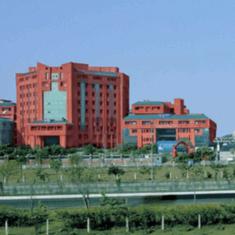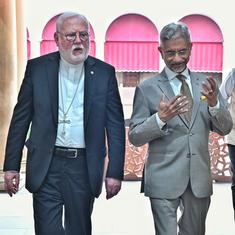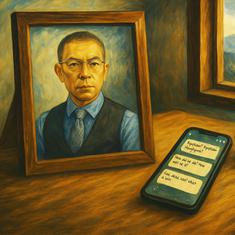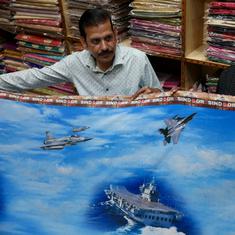It is the arid sameness of the desert that makes it difficult to navigate for a lost traveler. There is no reference point. It’s the same for people who have been in jail for a while: one loses precision in pinpointing time. That’s what my friend Umar Khalid said during one of our jail mulaqats.
It has been almost four years since he was put behind bars. When I thought about it on my way back from Tihar, I could sense more clearly what he meant. We say, “the day before we met last week” or “the week after she moved to Hyderabad”. That’s how we make timelines. We have different timelines with different sets of people – family, office colleagues, college friends. We have many points of reference to orient our lives as they are in motion.
But in jail, Umar said, after a point time becomes a lump, a blurr. That’s what the jail’s routine, monotony, and listlessness does. So, when one of the inmates returned after his two-week parole, Umar ended up asking, “How come you are back? It has hardly been a week!”
In jail, one starts to develop a very different relation with time. The measure of time is no longer days, not even weeks or months. Instead, Umar often refers to seasons. “Last winter, I wanted to read only fiction,” he would say. Or, “This summer is worse in terms of heat.”
In 2020 when he was sent behind bars, my biggest concern was his restlessness. We knew him as someone whose association with time was from minute to minute. He always had plans. Let’s meet with him, let’s write about that. Be it an atrocity on Dalits in Tamil Nadu or a case of harassment in the name of “love jihad”, an Islamophobic comment in Europe or a sanitation workers’ strike on campus, we knew him as someone who wanted to speak up about every indignation. Often there wouldn’t be enough hours to accommodate all his demands and restlessness.
Umar Khalid withdraws his bail petition from Supreme Court.
— Kaushik Raj (@kaushikrj6) February 14, 2024
For over 10 months, Supreme Court adjourned his bail matter 14 times and didn't even give him a chance to present his case. This is a travesty of justice! pic.twitter.com/XFR7W3Adx1
In the first few months after his arrest, I would often worry how he would renegotiate his association with time. During our previous sojourn in jail, mercifully brief, I had been there with him to rein in his disquiet.
The public prosecutor in the session’s court recently referred precisely to this restlessness. The prosecution claimed that Umar’s cellphone data shows he was in the habit of creating media and social media narratives. The prosecution named several celebrities and activists with whom Umar had been in contact. They said that Umar regularly sent these people articles published by The Wire, The Quint and other publications. These articles were often shared by these celebrities and activists on their social media accounts.
Almost all major dailies covered this accusation that Umar had “amplified narratives” by messaging actors, politicians, activists. If one for a moment ignores the prejudice, the anti-Muslim bigotry and the drama of reading out his personal messages in court, we would be left wondering, “Where is the crime?”
Why was this even being discussed in court? Was he being accused of talking to people? Of sharing his concerns? Was he being accused of practicing democracy?
What did these messages really pertain to? The prosecution referred to his appeal to his friends to raise their voices about freeing Dr Kafeel Khan, the Gorakhpur doctor who was sent to jail for his crime of making desperate attempts to save the lives of infants, in the process exposing the pathetic state of health on the home turf of Uttar Pradesh Chief Minister Adityanath. Khan was acquitted of all charges in 2019 by the court. So if Umar contacted somewhat influential people with secular credentials and shared appeals for the doctor’s release, where is the crime?
Similarly, what is the crime in demanding the release of university students?
Well, that’s what Umar is. Restless. He would do whatever he could: share messages, voice his indignation, write or protest against any injustice. That sounds like the actions of an ideal citizen, a passionate youth.

When I met him last in jail, Umar had already read these headlines. He said the one that had particularly stood out had appeared in a Hindi daily, referring to him as a great “story-teller”. He was amused as it had a literary gloss to it. But he was well aware that it was not meant in any positive sense.
A greased glass panel separates us as we speak into our 1990s-style phone receivers. The glass is only as transparent as the government’s data on Covid deaths or unemployment. But through that murky pane, Umar tries to soak in as much information from the outside world as he can manage in a mulaqat. This is the only instance in which he feels that time just rushes past.
He always inquires about my parent’s health, about what is worrying me, about other friends, about small joys and big frustrations. But mainly, he just loves to talk. He talks like he is losing breath, like he is trying to pack in as many words per minute as possible. One can sense his anguish that having so many pent up thoughts but no one in jail to share them with.
He talks about what he is reading – and he has read a lot, given the only thing he has in abundance is time and he does not have distracting devices with which to fritter it away. He once gave me a lecture on “doom scrolling” and laughed when I pointed out he would be doing the same if he were not on the other side.
He is eager to give and receive some gossip, who is dating whom, who has had a break up in between. And finally, he shares – at length – his observations about where we are headed as a country, both the depths of despair and also the glimmers of hope. He speaks of the historic significance of the protests against the Citizenship Amendment Act as one of the biggest peaceful mass agitations in Independent India.
He speaks of the normalisation of hate, and what such high tolerance for bigotry means for a country. He speaks of the distortions of history, not just of the distant past anymore, but also of the recent past. Of how a consecration has erased from public memory the fact that a mosque had once existed, the demolition of which was considered a crime even by the Supreme Court.
Jailed without bail for three years, my comrade brother Umar Khalid continues to languish in prison. Mired in fabrications, inaccuracies & trumped up charges, a voice of conscience of the Indian nation has been silenced. We demand his unconditional release. #Umar3YearsInjustice pic.twitter.com/Zo5q60QdE9
— Jignesh Mevani (@jigneshmevani80) September 13, 2023
As India is in the middle of its most significant election, one that will decide the fate of the Republic, it is essential to remember that this regime has completely shut us off from the truth. It has converted most of the media into its cheerleaders. It has tried to keep us insulated from the crises of inflation, unemployment and alarming inequality by replicating the Roman “bread and circus” model – with the world’s tallest statue, the G-20 glitter, with the Central Vista and the sengol show.
It has also kept us away from the truth by keeping away the truthtellers – Umar Khalid, Prabir Purkayastha, Gulfisha Fatima, Siddique Kappan and others on a very long list.
But what our rulers have failed to do is to suppress the ability of these people to continue to spread joy and inspire us even from behind bars.
As I was taking the long solitary walk back from the mulaqat room during my last visit to Umar, I suddenly realised that even 50 metres away, I was still wearing a smile. Ear to ear. If someone can do that to you even after nearly four years in jail, that is more powerful than the forces of lies and hate.
I feel more relieved now that he has synced the clock of his mind to the slow-motion time of jail. But I also hope that Umar’s restlessness never ceases.
Anirban Bhattacharya is a researcher and democratic rights activist who is working at the Centre for Financial Accountability
Also read: The price that Umar Khalid is paying for dissenting in Modi’s India










